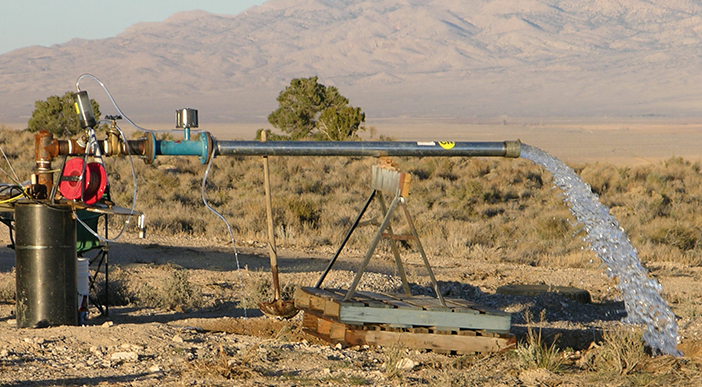Aquifer Characterization: A Case Study of Snake Valley, Nevada
University of South Alabama - GY425

This module introduces the use of pump tests and slug tests to determine aquifer hydraulic properties at wells.
Target Audience
This module was written to supplement hydrogeology classes at the advanced undergraduate or early graduate student level. It assumes the student to have a working understanding of Darcy's Law, hydraulic conductivity, aquifer properties, and the basic groundwater flow equations in two dimensions.
Module Overview
This module focuses on the analysis of well tests (i.e. pump and slug tests) to determine key aquifer properties including hydraulic conductivity, transmissivity, and storativity and their related uncertainties. In addition, this module provides an overview of aquifers, hydraulic properties, aquifer characterization methods, and wells. A case study centered on a proposed plan to withdraw groundwater from the Snake Valley provides a real-world, case study for well test analyses.
Topics Covered
The purposes, techniques, and applications of aquifer testing
Pump tests, applications, and methods of analysis
Slug Tests, applications, and methods of analysis
Learning Objectives
The student will be able to explain why hydrogeologists and engineers characterize aquifers. (Bloom's taxonomy level 2: Understanding)
Given field data, the student will be able to solve for hydraulic properties using different methods. (Level 3:Applying)
Given imperfect field data, the student will be able to analyze the range of uncertainty in hydraulic parameters. (Level 4:Analyzing)
Given a description of an aquifer test, the student will be able to select an appropriate analysis method and justify that choice (Level 5: Evaluating)
The student will be able to demonstrate effective communication of complex scientific analyses to people who are already familiar with the underlying concepts (Level 3: Applying)
Course Authors
Alex Beebe
Associate Professor, Geology
University of South Alabama. Contact: dbeebe@southalabama.edu
Mark Hausner
Associate Research Professor, Hydrology
Desert Research Institute. Contact: mark.hausner@dri.edu
Tools Needed
Computer with access to Internet
Software (such as Excel, Matlab, R) for plotting data
Course Citation
Beebe, A. and Hausner, M. (2021). Aquifer Characterization: A Case Study of Snake Valley, Nevada. https://edx.hydrolearn.org/courses/course-v1:USA_DRI+GY425+2021_T1/about
Expected Effort
This module should take approximately 15 hours to complete.
